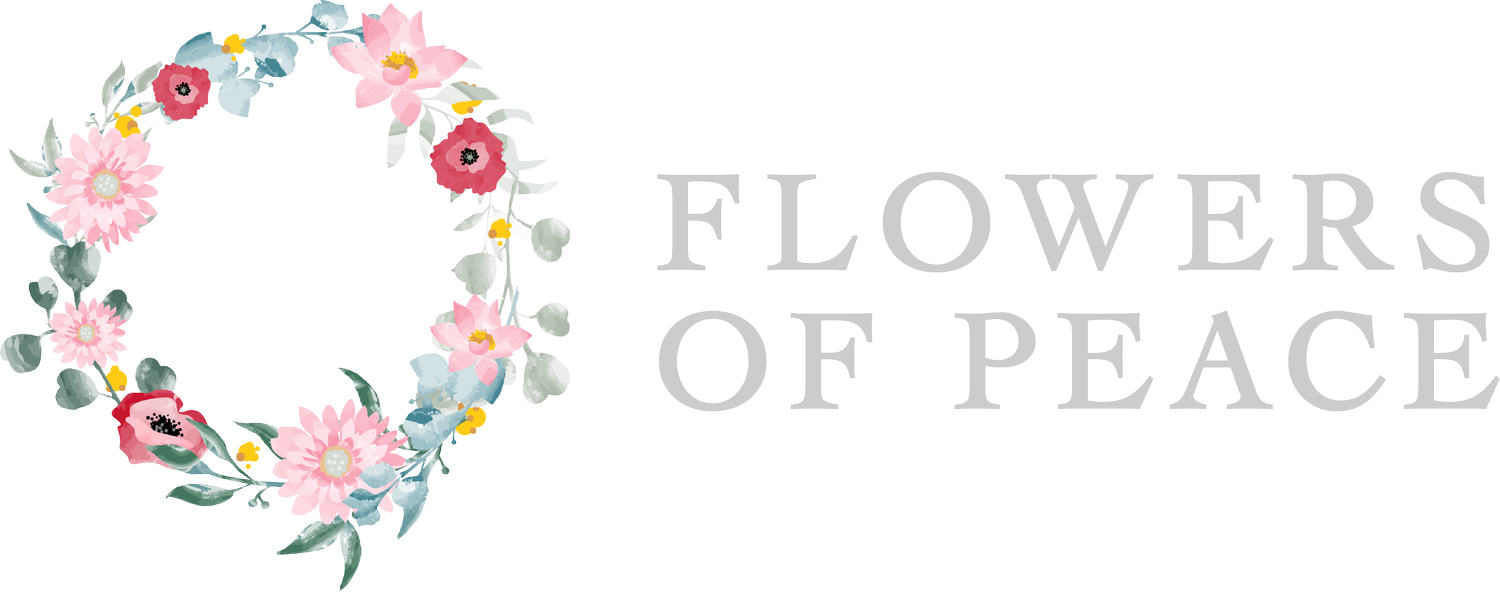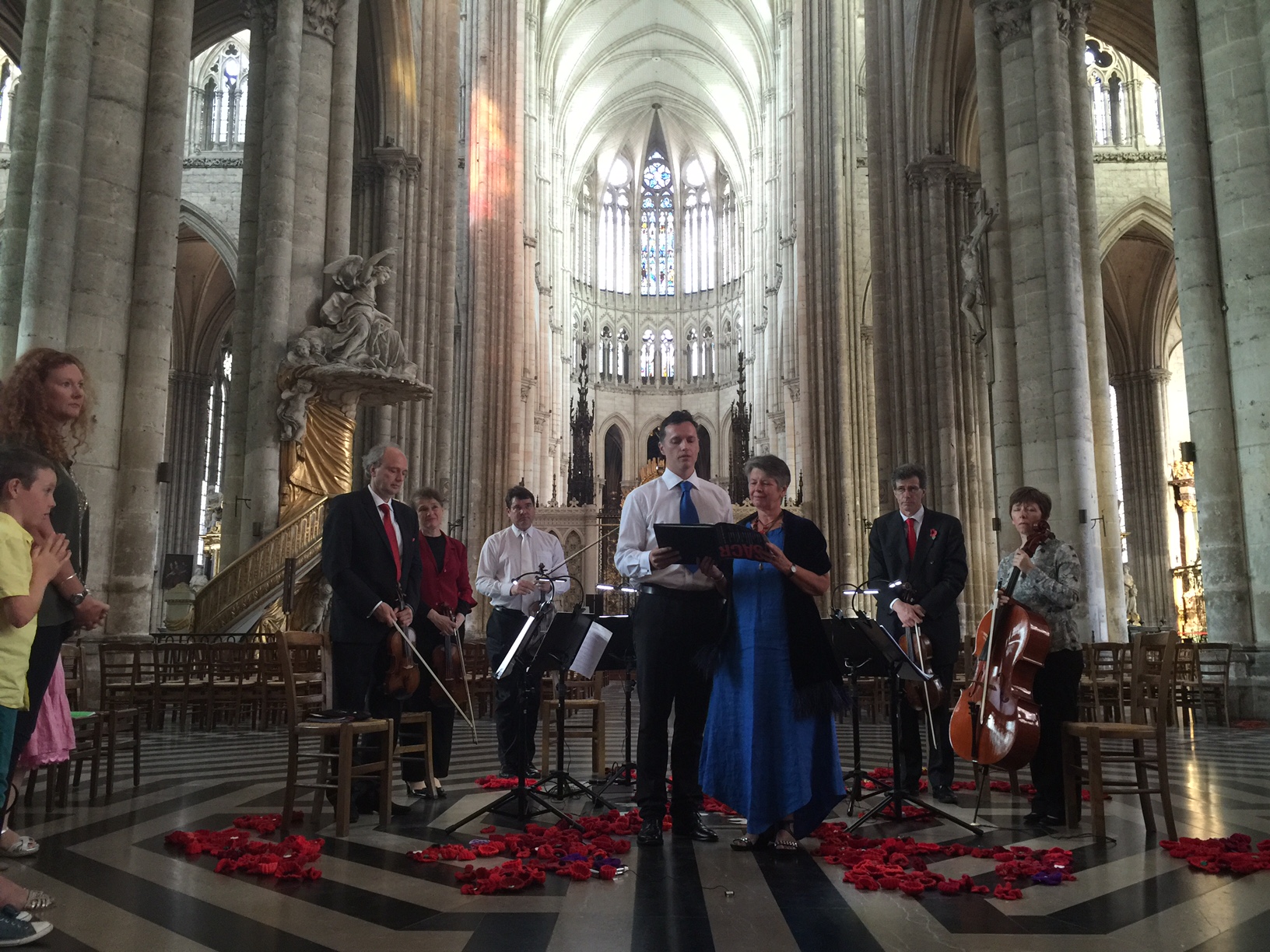performances linking music and the arts created during wwI
2018
Gustav Klimt - The Kiss - 1908
THE LOST JEWELS
Masters and masterworks lost to the Great War.
National Gallery of Australia on 10 and 11 August 2018
An extraordinary concert of musical and artistic treasures lost to the Great War, for soprano, tenor, chamber choir, string quartet and piano in order to mark the centenary of the final days of World War One. The music of composers from nine countries, lost to war or disease, are combined with the vivid projected images of paintings by Gustav Klimt, Egon Schiele (Austria), Umberto Boccioni (Italy), Franz Marc, August Macke and Wilhelm Morgner (Germany) who also died during WWI.
PERFORMERS: Louise Page soprano, Edward Neeman piano, Sculthorpe String Quartet (Anna McDonald and Christopher Latham violins, James Wannan viola, Paul Stender cello), Luminescence Chamber Choir
Directed by Christopher Latham, artist-in-residence at the Australian War Memorial.
The Flowers of War in Amiens Cathedral 2016
The Diggers' Requiem
LLEWELLYN HALL CANBERRA ON 6 October 2018
The Diggers’ Requiem is a nationally significant concert jointly commissioned by the Australian War Memorial (AWM) and the Department of Veterans' Affairs (DVA), produced and directed by Chris Latham and to be performed at Llewellyn Hall by Canberra’s leading professional musicians. The concert will be recorded and may be broadcasting by ABC FM.
The concert includes the commissioned works of five leading contemporary Australian composers and recently discovered music composed in the battlefields of France during WWI. The performing artists include 30 independent Canberra musicians, ten players from the Royal Military College Band, Duntroon (RMC) as well as 28 Young Artists selected from across Australia with French or German ancestry or WWI family connections. Four interstate and overseas soloists will also perform.
Septimus Kelly, Australian Irish Composer and Olympic Rower
The Diggers Requiem composed by Elena Kats-Chernin, Richard Mills, Nigel Westlake, Graeme Koehne and Ross Edwards tells the story of the major Western Front battles. It also features the final work of Australian composer Frederick Septimus Kelly who was killed in the Somme.
The Diggers’ Requiem has been commissioned to create repertoire about these iconic events for national use and to create a symbol that represents the close diplomatic relationship between France, Germany and Australia.
Contained within the Requiem are 5 movements from Nigel Westlake's Glass Soldier Suite which tell the story of Nelson Ferguson, a trumpeter and painter, who was gassed and partially blinded, while serving as a stretcher bearer in the battle of Villers-Bretonneux. Following the war, realising he could no longer paint, he and his sons instead created stained glass windows for churches throughout Victoria. Inspired by the memory of the great French medieval cathedral stained glass windows which he had seen before he was blinded. At the end of his life, surgeons gave him new corneas enabling him to finally see his own creations.
Monet's Blue Waterlilies, Musee D'Orsay 1916
2017
MONET: THE FLOWERS OF WAR
This concert is about the death of Impressionism, and how it was destroyed by the bullets and shells of the Great War. From that traumatic wound all of the colour of the Belle Époque bled out, leaving behind a sepia shell of cubism on one hand and a strange bloodless return to conservatism on the other. This program is an exaltation of Monet’s exploration of the emotional resonance of pure colour.
The wartime masterworks of Claude Monet, the world’s most prolific artist of WWI. Unveiling the story of his Waterlily series, as he raced to complete them before he went blind. Revealing his neighbourly friendship with French PM Georges Clemenceau, whose regular visits involved saving Monet’s paintings from the fire. Monet would eventually give him the best of these paintings as a gift to France at the end of the war, his contribution to the war effort. Interwoven with the works of serving impressionist composers, Jean Cras, Reynaldo Hahn, Albert Roussel, Maurice Ravel and also Claude Debussy who dies in 1918 of cancer.
THE HEALERS
Norah Neilson Gray - The Scottish Womens' Hospital in France in the Cloister of the Abbaye at Royaument
Exploring the role of women, doctors and stretcher bearers in war. Following the lives of three nurses including Vera Brittain, suffragette author of Testament of Youth, Chris Latham's grandmother Beryl Churchill (cousin of Winston), and Australian nurse Sister Alice Ross King. Music by musicians such as Lilli and Nadia Boulanger and those who served as stretcher bearers - Cecil Coles, Jacques Ibert, Joseph Boulnois and André Caplet
Frank Crozier, the Mud of Desolation
1917 - THE NIGHT IS DARKEST BEFORE THE DAWN
A musical portrait of one of the most tumultuous years in our history.
1917’s battles of Bapaume, Arras, Bullecourt, the Russian Revolution, the French Army’s revolt, the Birth of Finland, and the battles of 3rd Ypres, Passchendaele and the Charge at Beersheba.
1917 compositions by Lili Boulanger, Ivor Gurney, Louis Vierne, Benjamin Dale, Ervin Schulhoff, Jean Sibelius and Sergei Prokofiev, plus a preview of The Diggers’ Requiem, with premieres of work by Nigel Westlake, Alex Lithgow, Richard Mills and Elena Kats-Chernin.
2016
Franz Marc, Fate of the Animals, 1913
THE MAN WHO PAINTED BLUE HORSES
Verdun and the death of Franz Marc
The concert celebrates the work of Franz Marc, who was killed at Verdun. His pencil sketches made during that battle are transformed with colour in a dramatic slide show to be shown for the first time. The music by Marc’s contemporaries, both French and German, many of whom died on the battle field.
Music: Maurice Ravel, Albert Roussel, Erwin Schulhoff, Botho Sigwart, Rudi Stephan, Pierre Vellones, Mel Bonnis and Louis Vierne.
Diary accounts:Franco-Australian “poilu” and Verdun veteran, Jacques Playoust, a Sydney born translater, from a wool selling family who sent Australian wool to make French uniforms
Sacrifice
SACRIFICE
remembering the lost voices of the Somme
This event will celebrate twelve composers of six nationalities (Australian, New Zealand, Canadian, English, German and French) who were lost at the Somme. We also focus on the price paid by villages destroyed in those battles.
The concert presents music composed in the trenches, in a hospital, and before joining up. The program is designed to be performed in France in the churches of the Somme villages that were left in ruins. It will end with pipe tunes written by some of the 500 pipers and drummers killed in action, three of whom were awarded Victoria Crosses for their playing.
Music: Music by FS Kelly, Willie Braithwaite Manson, James Richardson, George Butterworth, Francis Purcell Warren, Johannes Schmiedgen plus Walter Braunfels, Botho Sigwart, André Caplet, Reynaldo Hahn, Deodat de Severac and Lili Boulanger.
THREE TREASURES
Australia’s great cultural loss
One hundred years later, we explore the creative talent of three forgotten composers, now united by music long after they died: Australian Frederick Septimus Kelly, (a gold medal winning rower who died in the Somme in 1916) Frenchman Claude Dubosq (a translator for the British army who died in 1938) and German Botho Sigwart (a German Count who served in Flanders and France, and died 1915 in Poland on the eastern front).
The concert brings alive the fortitude and talent of three young men who composed – maybe as a way of coping with the horror – moments of beauty and reflection, in this collection of almost unknown music uncovered by Chris Latham.
Life, Death & Transcendence
Verdun & the World War 1 Sketchbook of Franz Marc
A Conversation & Concert - Music from the Great War by German and French composers, including works written in the trenches at Verdun, accompanied by projected images of the WW1 studies of Franz Marc, Germany’s greatest cultural loss of the Great War, killed on 4th March 1916 at the Battle of Verdun.
Performers: Louise Page soprano, Tamara-Anna Cislowska piano, the Sculthorpe Quartet (Veronique Serret & Christopher Latham violins, Tor Fromyr viola, David Pereira cello)
2015
Re sounding Gallipoli
Music from the Gallipoli campaign
Based on authentic accounts from the period, this concert will feature performances on brass instruments originally played at Gallipoli and now held privately or by the Australian War Memorial. These instruments will be restored especially for this event.
With: Alex Knight – baritone; Paul Goodchild – cornet and bugle; Graeme Reynolds – bugle; Anton Wurzer – accordion; Alan Hicks – piano; Canberra Camerata Brass; Chris Latham – violin and Musical Director; and other performers












